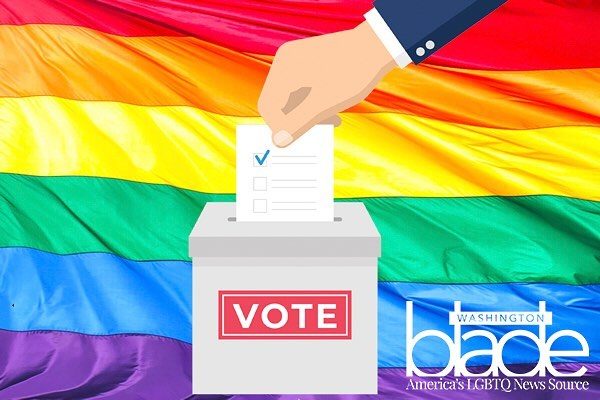2018 Midterm Elections
Reeder falls short in race for D.C. Council seat
Incumbent city officials win re-election by wide margins
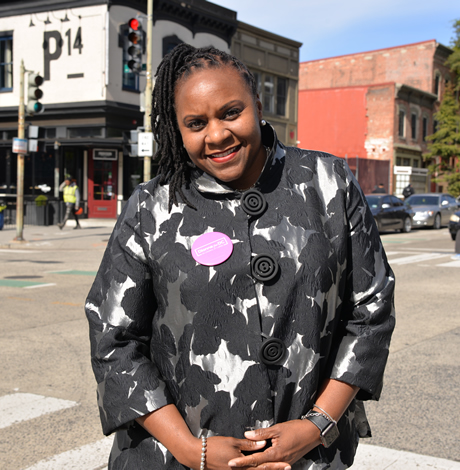
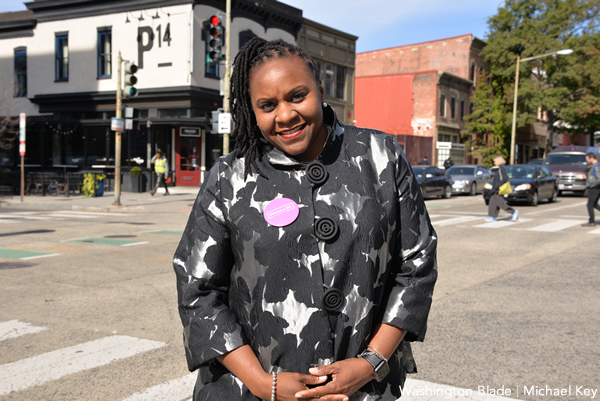
Dionne Reeder (Washington Blade photo by Michael Key)
Lesbian businesswoman Dionne Reeder, who had the enthusiastic backing of Mayor Muriel Bowser and received a strongly worded endorsement from the Washington Post, lost her race for an At-Large seat on the D.C. Council on Tuesday to incumbent Council member Elissa Silverman.
Reeder and Silverman ran as independents in a six-candidate race for two at-large Council seats, with one of the two seats reserved for a non-majority party candidate under the city’s election law.
With Democrats holding all but two of the 13 Council seats, the restriction in the election law meant that a Democrat could only hold one of the two seats but a non-Democrat could hold both seats.
In Tuesday’s election, incumbent Democrat Anita Bonds, a longtime supporter of LGBT rights, came in first place, easily winning re-election to her at-large seat by capturing 44.4 percent of the vote. Silverman came in second place to win re-election with 26.6 percent. Reeder finished third with 14.4 percent of the vote.
Statehood Green Party candidate David Schwartzman came in fourth place with 7.7 percent followed by Republican Ralph Chittams with 2.5 percent and independent Rustin Lewis with 2.5 percent.
With all but one of the city’s 143 electoral precincts counted as of midnight, the D.C. Board of Elections results showed that Reeder came in second place behind Bonds but ahead of Silverman in Wards 7 and 8. She finished in third place in the other six wards, including sections of Wards 1, 2, and 6 thought to have high concentrations of LGBT residents.
In her concession speech at her election night gathering at the Ivy City Smokehouse restaurant and nightclub in Northeast Washington, Reeder urged about 200 cheering supporters not to “feel bad for me,” saying she believes her campaign established an important dialogue and movement to help improve the lives of all city residents.
“I am not going to stop working for this city,” she said, prompting many in the audience to shout, “We love you!” and “Run again!”
With Silverman having a strong record of support on LGBT issues and Reeder being a longtime LGBT rights advocate the issue of LGBT rights didn’t appear to be a factor in the Reeder-Silverman race.
Five other lesser known gay candidates running in Tuesday’s D.C. election, four running under the Libertarian Party banner and one running as an independent lost their races by wide margins. Among them were longtime Libertarian Party activist Martin Moulton, who was among three lesser-known candidates running against Bowser for mayor.
As predicted by virtually all local political observers, Bowser, a strong supporter of LGBT rights, won re-election by capturing 76.2 percent of the vote. Statehood Green Party candidate Ann Wilcox came in second with 9.4 percent of the vote followed by independent Dustin Canter, who received 6.9 percent.
Moulton came in fourth place with 3.4 percent of the vote.
Gay Libertarian Party activist Bruce Majors finished in third place in his race against Democrat Eleanor Holmes Norton for the D.C. Congressional Delegate seat, receiving 1.8 percent of the vote. Norton won re-election with 86.9 percent, coming in far ahead of Majors and Statehood Green Party candidate Natale Stracuzzi, who received 3.8 percent.
Norton, a non-voting member of the U.S. House of Representatives, is considered one of the strongest LGBT rights supporters in Congress.
Two of the gay candidates who ran in Tuesday’s D.C. election drew attention for their status as a married couple. Libertarian Ethan Bishop-Henchman, who challenged Democrat Phil Mendelson for the D.C. Council Chair seat, lost to Mendelson by a margin of 89 percent to 8.4 percent.
His husband, Libertarian attorney Joe Henchman, ran against incumbent Democrat Karl Racine for the D.C. Attorney General’s position. Racine won re-election, finishing ahead of Henchman by a margin of 92.8 percent to 3.8 percent.
Gay independent Jamie Sycamore, who challenged Ward 1 Council member Brianne Nadeau, a Democrat, received the highest percentage of votes among all of the gay candidates running in Tuesday’s D.C. election. He received 20.9 percent of the vote compared to Nadeau, who won re-election with 78.2 percent of the vote.
In other D.C. Council races, incumbents Mary Cheh (D-Ward 3), Kenyan McDuffie (D-Ward 5), and Charles Allen (D-Ward 6) won re-election by wide margins against lesser-known challengers. All three are longtime strong supporters of LGBT rights.
Also winning re-election were D.C. “shadow” Sen. Michael D. Brown and “shadow” U.S. Rep. Franklin Garcia. Both are Democrats and LGBT rights supporters. The two positions, which are unpaid and hold no congressional powers, were created to serve as advocates for D.C. statehood.
Reeder, who owns a restaurant in the city’s Anacostia neighborhood, received the backing of the business community, including advocates for small community based businesses like hers. But although she served in the administration of former Mayor Anthony Williams as Williams’ Ward 8 coordinator and worked in other government and private sector positions her lack of citywide name recognition placed her at a disadvantage in her race against Silverman, according to political observers.
Among the issues that dominated the Reeder-Silverman rivalry was the city’s controversial paid family leave statute, which Silverman played a lead role in shepherding through the Council. Bowser was among the faction of city leaders who opposed the legislation on grounds that it used taxpayer money and a special tax on businesses to pay for leave for employees who work in D.C. but live in Maryland and Virginia.
Reeder sided with the mayor’s position, saying the legislation hurts small businesses that provide jobs to a large number of city residents. She said she favored a revised version of the legislation that would focus on city residents and would be less of a burden on small businesses.
Silverman argued that the legislation was needed to help all workers who often face the burden of having to take leave to help ailing parents and other family members in a city with a high cost of living. She positioned herself in the election as a “progressive” and sought to portray Reeder as being captured by business interests.
Although Reeder, if elected, would have become the city’s first LGBT person of color and first LGBT woman to serve on the D.C. Council, her candidacy didn’t appear to draw the support of large numbers of LGBT activists.
Political observers familiar with D.C. voting trends said they view Silverman’s decisive win as another sign that much of the city’s electorate favors candidates perceived as “progressive,” even though Reeder could be viewed as progressive on most issues.
Gay activist Marvin Bowser, the brother of Mayor Bowser and a strong supporter of Reeder, said he considers Reeder to have done well for a first-time candidate for public office.
“For someone who has not held elective office to fall less than 12 points behind an incumbent is not a bad showing,” he said. “So I hope that Dionne remains engaged in the political process, continues to push for the programs that she advocated during her candidacy, and comes back for another run.”
2018 Midterm Elections
Chris Pappas backs Pelosi for House speaker
New Hampshire Congressman-elect is openly gay
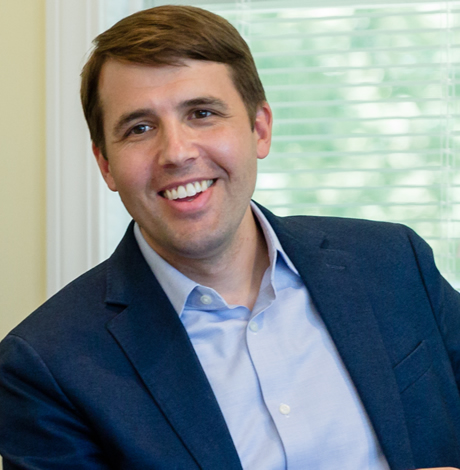
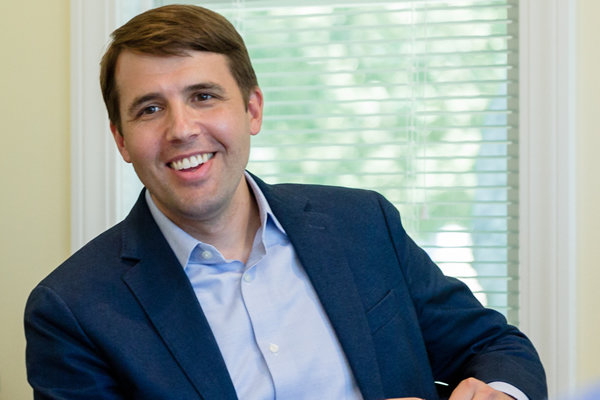
New Hampshire Congressman-elect Chris Pappas will be the first openly gay member of Congress from the Granite State. Pappas on Nov. 27, 2018, announced he backs Nancy Pelosi’s bid to once again become speaker of the U.S. House of Representatives. (Photo courtesy of Chris Pappas for Congress)
Pappas spoke with Pelosi on Monday night. Pappas in a statement said “after careful consideration and discussion with many constituents and future colleagues in Congress, I have decided to support Nancy Pelosi for speaker of the House.”
“I believe she is best equipped to lead the House at this point in our history,” he said. “My conversations with her convinced me she will lead with fairness and empower the incoming class to play a significant role in the work ahead. We must get down to doing the people’s business quickly, and we should start by reforming the way Washington works, lowering the cost of health care and creating an economy that allows everyone to succeed.”
Pappas earlier this month defeated Republican Eddie Edwards in the race to succeed retiring U.S. Rep. Carol Shea-Porter (D-N.H.). Pappas, who will represent New Hampshire’s 1st Congressional District that includes Manchester, the state’s largest city, will be the first openly gay member of Congress from New Hampshire.
Pappas told the Washington Blade on Monday during a telephone interview that he was “still working through” whether he would back Pelosi.
“It appears as though she may be the only candidate running,” said Pappas.
Democrats regained control of the House in this month’s midterm elections. Pelosi is running unopposed ahead of House Democrats’ leadership vote on Wednesday.
“We were sent there to provide checks and balances, to stand up to the Trump administration and leaders of both parties,” Pappas told the Blade.
Pappas, 38, was born and raised in Manchester.
He was elected to the New Hampshire House of Representatives in 2002. Pappas served two terms as treasurer of Hillsborough County, which includes Manchester. He was elected to the New Hampshire Executive Council, which advises the state’s governor, in 2012.
Pappas co-owns the Puritan Backroom, a popular Manchester restaurant. He told the Blade that his work “has prepared me well” for Congress.
‘LGBT community is being embraced not just on the coasts’
Two lesbian women — Minnesota Congresswoman-elect Angie Craig and Kansas Congresswoman-elect Sharice Davids — and California Congresswoman-elect Katie Hill, who is openly bisexual, were elected to Congress this month along with Pappas. Four openly gay men — U.S. Reps. David Cicilline (D-R.I.), Mark Pocan (D-Wis.), Mark Takano (D-Calif.) and Sean Patrick Maloney (D-N.Y.) — won re-election.
U.S. Sen. Tammy Baldwin (D-Wis.), who is the first openly lesbian woman elected to the U.S. Senate, defeated Republican state Sen. Leah Vukmir. U.S. Sen.-elect Kyrsten Sinema will be the first openly bisexual person in the U.S. Senate after she defeated U.S. Rep. Martha McSally (R-Ariz.) in the race to succeed retiring U.S. Sen. Jeff Flake.
“We had a number of very compelling candidates running across the country,” Pappas told the Blade when asked about his election to Congress. “They’re from places like Minnesota and Kansas and New Hampshire and California. That shows the LGBT community is being embraced not just on the coasts, not just in big cities.”
Pappas also praised the two openly trans women — Gerri Cannon and Lisa Bunker — who were elected to the New Hampshire House this month.
“They were great candidates who ran strong campaigns,” said Pappas. “It’s wonderful that they were elected, that they broke down barriers in New Hampshire.”

New Hampshire Congressman-elect Chris Pappas works in his family’s restaurant in Manchester, N.H. (Photo courtesy of Chris Pappas for Congress)
Pappas to ‘reserve judgment’ on possible Trump impeachment
Pappas told the Blade that additional funding for treatment and recovery programs to address the country’s opioid crisis and reducing student loan debt are among his top legislative priorities once he is takes office in January. Pappas also said he supports a government reform bill that Democrats plan to introduce once they retake control of the House.
“It’s no accident the first bill out of the gate is going to be a government reform bill that restores our democracy,” said Pappas. “This is going to be a really important piece of legislation to put power back in the hands of the people.”
Pappas also said it is “critical” that special counsel Robert Mueller be allowed to finish his investigation into whether President Trump and/or any of his associates had any involvement in Russia’s interference in the 2016 election.
“We need to allow him to finish his work and put everything out on the table,” Pappas told the Blade. “The facts are what’s driving the conversation.”
Pappas said he will “reserve judgment” on whether Trump should be impeached until Mueller releases his final report.
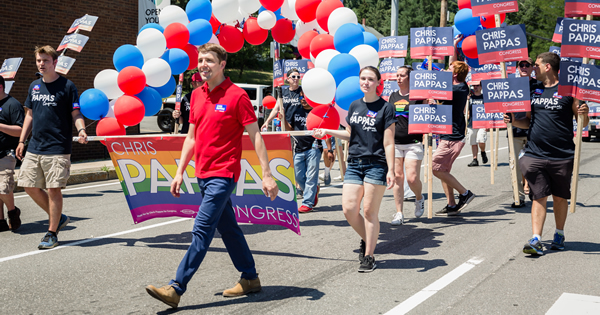
2018 Midterm Elections
Trans state representatives-elect reflect on historic elections
Danica Roem inspired legislators-to-be to run
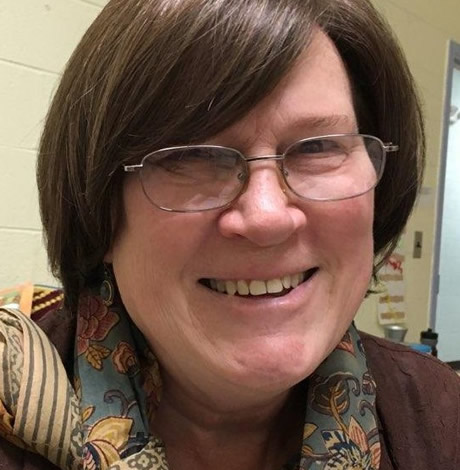
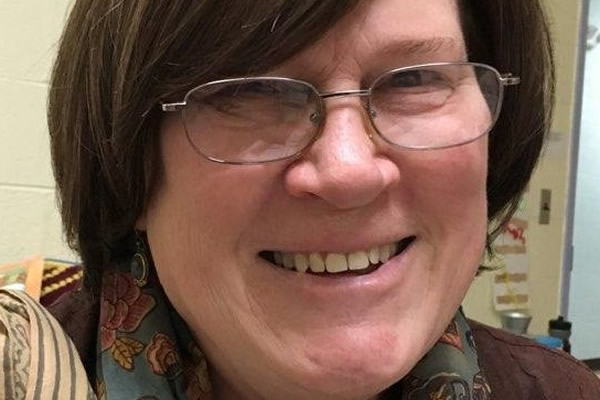
New Hampshire state Rep.-elect Gerri Cannon will be one of two openly transgender women in the state House of Representatives when she is officially sworn in next month. (Photo courtesy of Gerri Cannon)
The three openly transgender women who were elected to their respective state legislatures earlier this month each spoke about their historic elections with the Washington Blade on Monday.
New Hampshire state Rep.-elect Gerri Cannon finished second in Stafford County District 18, which includes most of the city of Somersworth and the neighboring town of Rollinsford. She was elected to the Somersworth School Board in 2017.
Cannon, who is a vocal trans rights advocate, told the Blade she had been approached to run for the New Hampshire Legislature a decade ago when lawmakers were debating same-sex marriage and trans rights. Cannon said she “couldn’t afford it,” noting House members’ annual salary is $100.
“In New Hampshire running for office means you’re basically donating your time to the state,” she said.
Cannon on Nov. 6 is believed to have become the first openly trans woman in the U.S. elected to two offices.
“I’m thrilled to have won because now it gives me an opportunity to help other people,” she told the Blade. “In another way, it proves that a trans person can run for office.”
New Hampshire state Rep.-elect Lisa Bunker made a similar point.
She will represent Rockingham County District, which includes the city of Exeter, in the New Hampshire House. Bunker’s district is less than 25 miles south of Cannon’s district. Bunker and Cannon will take the oath of office next month.
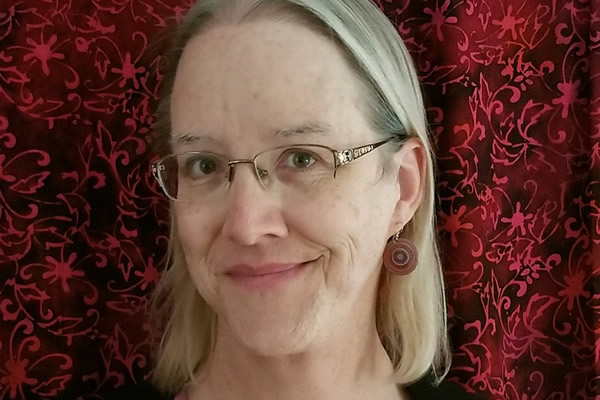
New Hampshire state Rep.-elect Lisa Bunker (Photo courtesy of Bunker)
Bunker told the Blade during a telephone interview from the Spanish city of Seville where she is currently on vacation that she “was deeply upset, as many people were” about the 2016 election results. She also noted she attended last year’s debate in the New Hampshire House over a bill that would have added gender identity to the state’s nondiscrimination law.
Lawmakers tabled the measure that gay state Rep. Ed Butler introduced in 2017. Republican New Hampshire Gov. Chris Sununu in June signed an identical bill into law after it passed in both houses of the state Legislature.
“There are many, many people in the country who have never met a trans person or never knowingly met a trans person,” Bunker told the Blade, referring to the debate over the 2017 trans rights bill. “I got to have that experience as well.”
Bunker stressed she doesn’t her gender identity factors into her “being an effective state legislator.” Bunker nevertheless added her soon-to-be-colleagues will “serve alongside a couple of trans people and see how incredibly normal we are and see us as human.”
Colorado state Rep.-elect Brianna Titone made a similar point, noting to the Blade she and her campaign “stood away from” her gender identity “as much as we could.”
“It’s not something we hid,” said Titone. “At the doors, we really focused on the issues important to people.”
Titone, a geologist who defeated Republican Vicki Pyne, will represent the state’s House District 27, which includes the Denver suburb of Arvada, in the Colorado House of Representatives when she takes office in January. Titone will be Colorado’s first openly trans lawmaker.
Titone told the Blade her district is traditionally conservative, but a number of factors contributed to her victory. These include 2010 redistricting in Colorado and more registered Democrats in her district.
“We just had a lot of momentum,” said Titone. “We knew if this was going to be the year to flip the district, this was going to be it.”
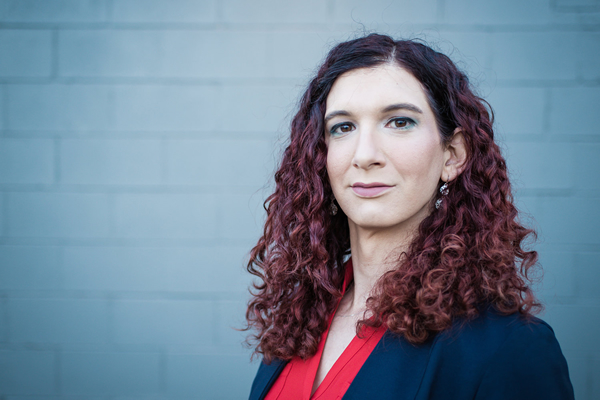
Colorado state Rep.-elect Brianna Titone (Photo courtesy of the Titone Campaign)
Danica Roem ‘electrified me’
Cannon, Bunker and Titone were elected a year after Virginia state Del. Danica Roem (D-Manassas) defeated anti-LGBT Republican Bob Marshall.
Roem, a former journalist, in January became the first openly trans person to be seated in any state legislature in the country. Cannon, Bunker and Titone all told the Blade that Roem inspired them to run for office.
“She ran a principled campaign on her qualifications on the issues and she won,” said Bunker. “She electrified me.”
Titone told the Blade she emailed Roem early in 2018 and asked her for advice. The two later spoke on the phone before Roem traveled to Colorado to campaign in support of her.
“I was inspired to run from her win,” said Titone.
Roem also campaigned for Christine Hallquist, an openly trans woman who lost to incumbent Republican Vermont Gov. Phil Scott. Hallquist, the former CEO of the Vermont Electric Cooperative, in August became the first openly trans person in the U.S. to obtain a major party’s nomination in a gubernatorial race.
“It’s humbling to hear from well-qualified, hard-working, victorious trans women in Colorado and New Hampshire that what we accomplished by winning here in the 13th District last year inspired some of them to run — and win,” Roem told the Blade on Monday in an email. “Yet make no mistake: state representatives-elect Brianna Titone, Gerri Cannon and Lisa Bunker won because of their ideas, because of their work ethic and because of their character. Their voters and soon-to-be constituents chose them because of who they are and what they stand for.”
Roem noted Monika Nemeth on Nov. 6 became the first known trans person elected to the D.C. Advisory Neighborhood Commission. Roem also pointed out Massachusetts voters on Election Day upheld their state’s trans rights law in a referendum.
“The example that we set in 2017 and that we’ve reinforced in 2018 is transgender people who are committed to serving the people they run to represent should bring their ideas to the table too because the people of our communities, states and country need our character and ideas,” she said.
“The example we’ve set here in the 13th District of tireless advocacy for my constituents through an inclusive work ethic and relentless constituent service is a model that I hope can be shared nationally as more and more transgender people win elections and begin to serve their constituents,” added Roem.
Roem also encouraged more trans people to run for office.
“Indeed the service of transgender elected officials across the country has made a mark on the national character, one in which we’ve recognized this truly is our America too,” she said.
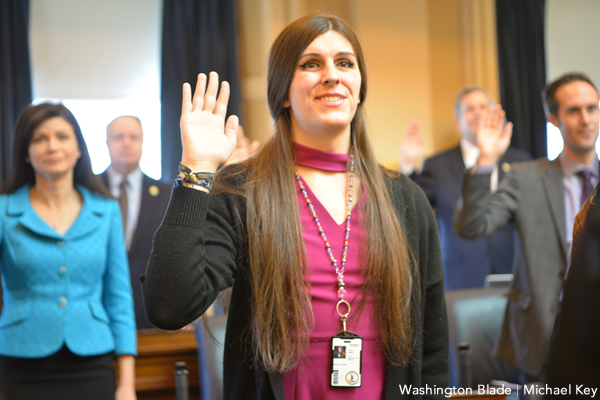
Virginia state Del. Danica Roem (D-Manassas) was sworn in on Jan. 10, 2018. She is the first openly transgender person ever seated in a state legislature in the U.S. (Washington Blade photo by Michael Key)
2018 Midterm Elections
More voters identify as LGBT — and they back Democrats
Exit polls show overwhelming support for the ‘blue wave’
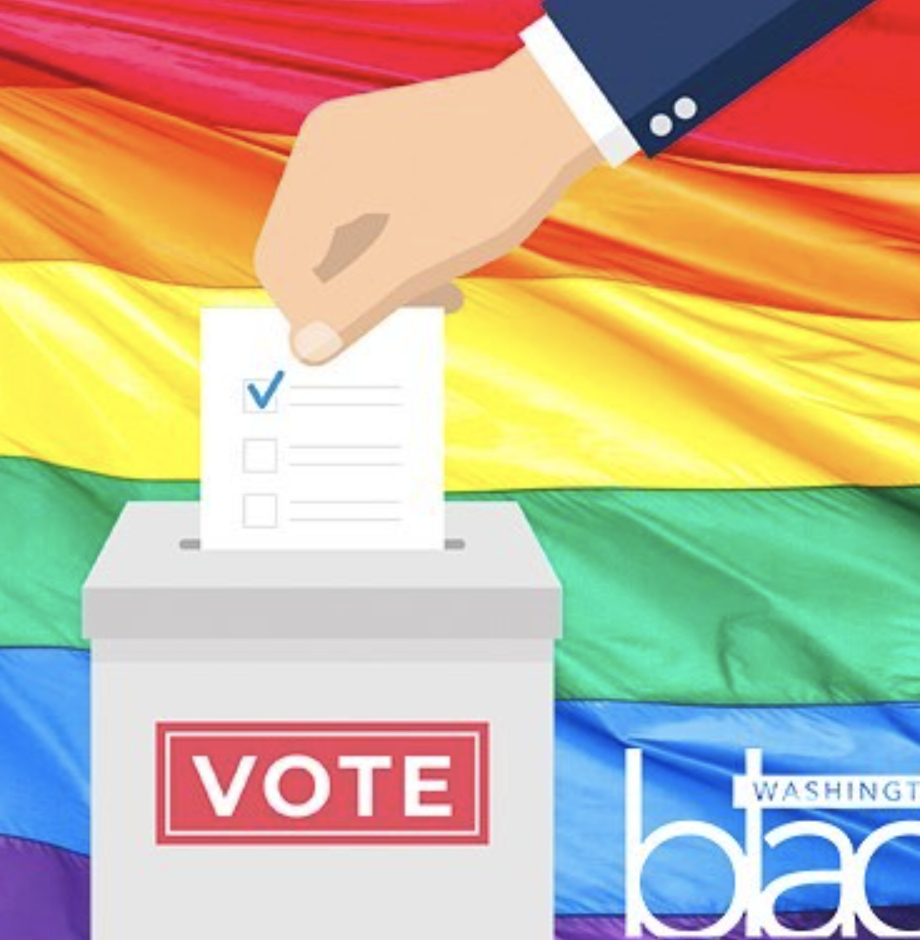
Exit polling on Election Day 2018 revealed striking data about the strength LGBT voters, demonstrating they constitute a sizable 6 percent chunk of the electorate and overwhelmingly support the Democratic Party.
A trifecta of sources — exit polling from CNN, NBC News, the Wall Street Journal — consistently revealed 6 percent of the voting bloc in the congressional mid-term elections identified as LGBT. That sizable bloc represents a slight increase from years past, when an estimated 5 percent would tell a pollster they identified as LGBT.
Chad Griffin, president of the Human Rights Campaign, said in a conference call with reporters last week that exit polling has been inconsistent on including LGBT people, but his organization months ago asked media outlets to include this question to assess the size of that voting bloc.
“Once we know what the total voters are, that is likely to be around 7 million voters identified as LGBT,” Griffin said. “What’s important to note: That means 6 percent of the electorate identified to a stranger — in most cases in a swing state that they were LGBT. That is a powerful voting bloc, and that is an increase in turnout of LGBT voters from 2016.”
As the number of voters who publicly identify as LGBT has increased, so has that voting bloc’s support for the Democratic Party — at least according to exit polling from CNN and NBC News, which is based on data from the National Election Pool. Both of those outlets reported 82 percent of LGBT people voted in 2018 for a Democratic representative, while 17 percent voted Republican.
That represents an increase in Democratic support from years past. In 2016, 76 percent of LGBT-identified voters supported Hillary Clinton, but 14 percent voted for President Trump. In 2012, 77 percent of LGB-identified people voted for President Obama, while 23 percent voted for Mitt Romney.
The only other demographic group with stronger support for the Democratic Party was black voters, which in exit polls have consistently voted for Democrats over Republicans by a 9-1 margin.
Gary Gates, a former research fellow at the Williams Institute at the University of California, Los Angeles, said several factors could explain the greater number of voters identifying as LGBT as well as the increased support for the Democratic Party, including the anti-LGBT policies of the Trump administration.
“Decreased social stigma likely explains recent increases in the portion of the population identifying as LGBT,” Gates said. “Further, LGBT voters may feel particularly under threat from a Trump administration that has shown open hostility toward the transgender population and has made several attempts to minimize the visibility of LGBT populations in federal data sources. This could explain increases in LGBT voter engagement and willingness to support Democrats.”
Gates added demographic patterns among those who are coming out to exit pollers suggest younger women — who are more likely to support Democratic candidates — comprise an increasingly growing portion of people who are openly LGBT.
Daniel Pinello, a political scientist at the City University of New York’s John Jay College, said he’s unsure why there would be an increased shift toward Democrats among LGBT voters, but said the desire of federal LGBT non-discrimination protections could be a factor.
“After marriage equality, after the Obergefell decision of 2015, that’s really no longer a hot button political issue for our community,” Pinello said. “The only thing that’s really left is sexual orientation and gender [identity] discrimination in employment, housing and public accommodations, but I don’t know how much of a driving force that is politically in the same way I think marriage equality was. I doubt that most people have had those kinds of personal experiences of job discrimination of being gay or [transgender] or what have you compared to those people who have been denied marriage licenses in their lifetimes.”
The Wall Street Journal exit poll, however, demonstrates less support for the Democratic Party among LGBT people. In those results, 71 percent of LGBT voters backed Democrats, while 24 percent voted for a Republican candidate.
Transgender voters also identified separately in the Wall Street Journal exit poll, making up an estimated 1 percent of voters. Notably, those voters skewed slightly more toward the Republican Party than lesbian, gay and bisexual voters. Although a majority of transgender respondents, 58 percent, said they voted Democrat, 37 percent said they voted Republican.
Another notable point about the Wall Street Journal poll: Without the LGBT bloc, voters in the 2018 congressional mid-term election would have broken evenly between Democrats and Republicans. That indicates Democratic victories on Election Day wouldn’t have happened without LGBT support.
Gates, however, said relying on the CNN and NBC News data based on the National Election Pool is better for assessing LGBT trends as opposed to the Wall Street Journal data, which is relatively new and just started this year.
“The polling data used by the WSJ does show less, though still very strong, support for Democrats among LGBT voters, but it’s really not possible to use that to assess trends since this was the first year of that data collection methodology, which does differ from the NEP approach,” Gates said. “I will admit that the relatively strong support for Republican candidates among those identified as transgender in the new polling seems odd. But I really can’t speculate on the accuracy of that finding as data on transgender voting is very rare.”
-

 State Department5 days ago
State Department5 days agoState Department releases annual human rights report
-

 District of Columbia3 days ago
District of Columbia3 days agoCatching up with the asexuals and aromantics of D.C.
-

 South America3 days ago
South America3 days agoArgentina government dismisses transgender public sector employees
-

 Maine4 days ago
Maine4 days agoMaine governor signs transgender, abortion sanctuary bill into law







